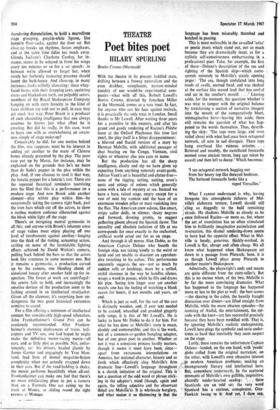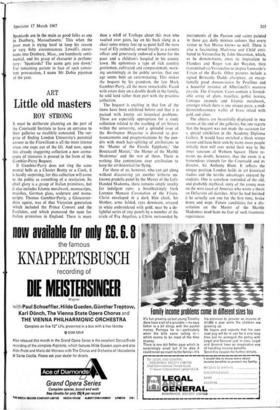Benito Cereno (Mermaid)
THEATRE
Poet bites poet
HILARY SPURLING
With the theatre in its present fuddled state, drifting between a frowsy naturalism and the even drabber, complacent, narrow-minded timidity of our would-be experimental com- panies—what with all this, Robert Lowell's Benito Cereno, directed by Jonathan Miller at the Mermaid, comes as a rare treat. In fact, for anyone who sets his face against revivals, it is practically the only treat in London. Small thanks to Mr Lowell. After waiting three years for a premiere in this country, and after his grand and gaudy rendering of Racine's Phedre (seen at the Oxford Playhouse this time last year), the play itself is a bitter disappointment: a blurred and flaccid version of a story by Herman Melville, with additional passages of chat bearing on the Congo, Vietnam, civil rights or whatever else you care to name.
But the production has all the sharp intelligence, clarity and zip we have given up expecting from anything remotely avant-garde.
Adrian Vaux's set is beautiful and clutter-free- none of the rigging, tatting, netting, crow's nests and strings of onions which generally come with a tale of mystery at sea. Instead we have a bare, raised stage, empty except for a row of neat toy cannon and the base of an enormous wooden pillar or mast vanishing into the flies. The American crew salutes, like smart, stripy sailor dolls, in silence; sleazy negroes pad forward, droning grimly, to suggest gathering gloom aboard the Spanish slaver. The unreality and absolute isolation of life at sea corresponds for once exactly to the enchanted, artificial world acted out for us on stage.
And through it all moves Alan Dobie, as the American Captain Delano who boards the foreign ship, not taking kindly to the weird or lurid and yet unable to discount an apprehen- sive twitching in his calves. This performance uncannily suggests the sea—not so much by sudden rolls or lurchings, more by a settled, stolid slowness in the way he handles silence, wraps a word in pauses, while he fills and draws, his pipe. Seeing him linger over yet another match, one has the feeling of watching a blank ocean for hours, if not months and years, on end.
Which is just as well, for the rest of the cast is distinctly wooden, and, if ever text needed
to be coaxed, wheedled and prodded gingerly with tongs, it is this of Mr Lowell's. He is lucky to have Mr Dobie to do it for him. For
what he has done to Melville's story is mean,
shoddy and contemptible; and this is the work, not of a common-or-garden bungling adaptor,
but of one great poet to another. Whether or not it was a conscious process hardly matters, though it seems it must have been, since—
apart from extraneous interpolations on
America, her national character, history and so forth which effectively clog Melville's firm
dramatic line—Lowell's language throughout
is a slavish imitation of the original. This is not a question of the odd word or phrase stick- ing in the adaptor's mind (though, again and again, the telling adjective and the observant detail are Melville's). It is wholesale burglary, and what makes it so distressing is that the language has been miserably thumbed and botched in passing.
This is most noticeable in the so-called 'arias' or poetic insets which stand out, not so much because they are dramatically inept, as for a stylistic self-consciousness embarrassing in a professional poet. Take, for example, the first of these—Delano's description of the sea and sighting of the Spanish ship—which corre- sponds minutely to Melville's stately opening pages : The sea, though undulated into long roods of swells, seemed fixed, and was sleeked at the surface like waved lead that has cool:A and set in the smelter's mould. . . .' Leaving aside, for the moment, the question whether it was wise to tamper with the original balance by transferring a section of narrative imagery into the mouth of • the comparatively blunt, unimaginative hero—leaving this aside, there still remains the question of what has hap- pened to the words themselves. Thus, describ- ing the ship: 'The tops were large, and were railed about with what had once been octagonal network, all now in sad disrepair. These tops hung overhead like ruinous aviaries. . . . Battered and mouldy, the castellated forecastle seemed some ancient turret, long ago taken by assault and then left to decay.' Which becomes:
'I see octagonal network bagging out from her heavy top like decayed beehives. The battered forecastle looks like a raped Versailles.'
What I cannot understand is why, having foregone this atmospheric richness of Mel- ville's elaborate texture, Lowell should still cling so doggedly to the bald remaining ; shreds. He shadows Melville as closely as he t once followed Racine—or more so, for, where the act of translation has so often stimulated him to brilliantly imaginative assimilation and re-creation, this dismal rendering-down seems to have had the opposite effect. What in Mel- ville is heady, generous, thickly-worked, in Lowell is flat, abrupt and often cheap. We all know what happened when Shakespeare sat down to a passage from Plutarch; here, it is as though Lowell plays prosy Plutarch to another master's Shakespeare.
Admittedly, the playwright's ends and means are quite different from the story-teller's. But this is no excuse when, of the two, Melville is by far the more convincing dramatist. What has happened to the language has happened more or less to the plot as well: the best scenes —the shaving in the cabin, the heavily fraught discussion over dinner—are lifted straight from Melville, while the more obscure episodes—the taunting of Atufal, the entertainment, the epi- sode with the knot—are less successful precisely because they have been meddled with. That is, by ignoring Melville's realistic underpinning, Lowell here plugs the symbolic and eerie under- tones so hard that inevitably they seem suspect on the stage.
Lastly, there remains the unfortunate Captain Delano—landed, on the one hand, with 'poetic' globs culled from the original narration; on the other, with Lowell's own obsessive interest
_ in modern American problems; making an incongruously literary and intellectual hero. But, somewhere underneath, lie the scattered remnants of Melville's own gullible, inquisitive, absurdly tender-hearted seadog: . . these Spaniards are an odd set; the very word Spaniard has a curious, conspirator, Guy- Fawkish twang to it. And yet, I dare say, Spaniards are in the main as good folks as any in Duxbury, Massachusetts.' This when the poor man is trying hard to keep his reason in very fishy circumstances. Lowell's excur- sions into Duxbury, Mass., are hopelessly senti- mental, and his grasp of character is perfunc- tory: `Spaniards? The name gets you down.' For remaining patient in face of such consis- tent provocation, I name Mr Dobie pipeman of the year.































 Previous page
Previous page